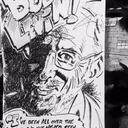Stay in the Loop
BSR publishes on a weekly schedule, with an email newsletter every Wednesday and Thursday morning. There’s no paywall, and subscribing is always free.
As I lay dying, or: Mind over matter
A near-death experience

I knew I was dead because the times I had almost died had not been like this. That could only mean I had passed beyond “almost” and reached “entirely”... dead.
The big difference this time was that I had left my body. I ”“ my “self”— hovered above it, trying to re-enter and resume life. Once I nearly did, but then I slipped away and headed from the living room toward the next stage, where people who had already passed— my parents, my sister, friends— awaited.
Adele, my wife, was trying to get me back in my body, to not leave her. But it was too late. This time I had gone too far.
I had blown out my heart. It was entirely my fault. I felt terrible. I was gripped by the crushing squeeze of regrets. Things undone. Things unsaid. The agonizing loss with which I had ripped Adele apart.
On the other hand, it wasn’t that bad. My gone-from-my-body self was aware of everything that was occurring in the living room. Adele just wasn’t aware of me. And she didn’t know that, when she passed from this life and reached the next stage, we’d be together again. So she felt terrible. And, since this situation was my fault, I felt terrible too.
But let me back up a minute.
Smoking dope
In January 2011, I had survived a “widow-maker” heart attack. Two months later, I suffered a second, more serious attack, which had required a several hour touch-and-go surgery and left me in a 48-hour coma. Six months following that, during surgery to repair my heart’s damage, my bleeding could not be stopped, and I had almost died again.
But I recovered so well. Now, at 71, I was doing nearly everything I had done before. Some things I did more of.
One of these was smoking dope. As part of my new doping life, I had been the recipient of gifts from similarly inclined acquaintances. One gift had been cookies. But I had forgotten how many their baker had said to eat.
So I’d eaten a second. And my inescapable conclusion was that I’d blown out my heart.
Paramedics arrive
Adele hadn’t actually been in the living room during my death experience. Nor had she urged me not to leave her. She had left me alone only for a few minutes, not the lengthy expanse I had imagined.
When she returned, she saw I was in trouble. Should she call someone?
Good idea.
The paramedics arrived another few minutes later— or another hour. Six— or eight— or a dozen beefy, good-natured young men filled the room. The tattooed, shave-headed crew chief hooked me to an EKG. My vital signs were— amazingly, comfortingly— normal.
We told him about the cookies. I didn’t sense that this information would reach my FBI file. I wasn’t even asked to divulge my supplier’s name. In fact, if my revelation changed anything, it was to transform me instantly from an object of concern to one of amusement.
I was relieved at not being dead. But I was embarrassed at being, like, this old hippie who couldn’t handle his dope, a joke to be told whenever ambulance crews gathered.
What really happened?
When I noticed the living room was empty, I asked Adele, hopefully, if I had hallucinated the paramedics too.
No such luck.
I would like to share my insights into the welcoming prospects for the afterlife with conviction. I would like to do this even if I didn’t know about the six-figure book advance paid to that seven-year-old for his account of his in-the-beyond meeting with Jesus. But my damn sense of journalistic ethics rules that out.
Adele thinks I had retrieved and replayed thoughts I held during my times under sedation— thoughts that had remained repressed until now. My cardiologist agrees. She thinks it may have been beneficial for my brain to have finally rid itself of the load it had been carrying.
There is enough of a sense of familiarity to my thoughts— as to a tune heard, forgotten and later re-encountered— that this explanation seems reasonable to me, too.
”˜Stay with me’
But also I recognize the imprint of popular culture. The TV detective shouting, “Stay with me!” to his shot and fallen partner may have stayed with me in some corner of my brain. I suspect that we build our forecasts for our futures from our accumulated experiences, beliefs and hopes.
The greater truth I took away was how much I wanted to live. Mind and, it seemed, body fought to keep life going. I imagine that process occurred during those earlier emergencies as well.
I have to think it helped that I couldn’t convince myself there was a place that I preferred to be, other than this Earth. If there is, I am content to wait to learn about it.♦
To read Bob Levin’s nine-part series about his heart attacks, begin here.
The big difference this time was that I had left my body. I ”“ my “self”— hovered above it, trying to re-enter and resume life. Once I nearly did, but then I slipped away and headed from the living room toward the next stage, where people who had already passed— my parents, my sister, friends— awaited.
Adele, my wife, was trying to get me back in my body, to not leave her. But it was too late. This time I had gone too far.
I had blown out my heart. It was entirely my fault. I felt terrible. I was gripped by the crushing squeeze of regrets. Things undone. Things unsaid. The agonizing loss with which I had ripped Adele apart.
On the other hand, it wasn’t that bad. My gone-from-my-body self was aware of everything that was occurring in the living room. Adele just wasn’t aware of me. And she didn’t know that, when she passed from this life and reached the next stage, we’d be together again. So she felt terrible. And, since this situation was my fault, I felt terrible too.
But let me back up a minute.
Smoking dope
In January 2011, I had survived a “widow-maker” heart attack. Two months later, I suffered a second, more serious attack, which had required a several hour touch-and-go surgery and left me in a 48-hour coma. Six months following that, during surgery to repair my heart’s damage, my bleeding could not be stopped, and I had almost died again.
But I recovered so well. Now, at 71, I was doing nearly everything I had done before. Some things I did more of.
One of these was smoking dope. As part of my new doping life, I had been the recipient of gifts from similarly inclined acquaintances. One gift had been cookies. But I had forgotten how many their baker had said to eat.
So I’d eaten a second. And my inescapable conclusion was that I’d blown out my heart.
Paramedics arrive
Adele hadn’t actually been in the living room during my death experience. Nor had she urged me not to leave her. She had left me alone only for a few minutes, not the lengthy expanse I had imagined.
When she returned, she saw I was in trouble. Should she call someone?
Good idea.
The paramedics arrived another few minutes later— or another hour. Six— or eight— or a dozen beefy, good-natured young men filled the room. The tattooed, shave-headed crew chief hooked me to an EKG. My vital signs were— amazingly, comfortingly— normal.
We told him about the cookies. I didn’t sense that this information would reach my FBI file. I wasn’t even asked to divulge my supplier’s name. In fact, if my revelation changed anything, it was to transform me instantly from an object of concern to one of amusement.
I was relieved at not being dead. But I was embarrassed at being, like, this old hippie who couldn’t handle his dope, a joke to be told whenever ambulance crews gathered.
What really happened?
When I noticed the living room was empty, I asked Adele, hopefully, if I had hallucinated the paramedics too.
No such luck.
I would like to share my insights into the welcoming prospects for the afterlife with conviction. I would like to do this even if I didn’t know about the six-figure book advance paid to that seven-year-old for his account of his in-the-beyond meeting with Jesus. But my damn sense of journalistic ethics rules that out.
Adele thinks I had retrieved and replayed thoughts I held during my times under sedation— thoughts that had remained repressed until now. My cardiologist agrees. She thinks it may have been beneficial for my brain to have finally rid itself of the load it had been carrying.
There is enough of a sense of familiarity to my thoughts— as to a tune heard, forgotten and later re-encountered— that this explanation seems reasonable to me, too.
”˜Stay with me’
But also I recognize the imprint of popular culture. The TV detective shouting, “Stay with me!” to his shot and fallen partner may have stayed with me in some corner of my brain. I suspect that we build our forecasts for our futures from our accumulated experiences, beliefs and hopes.
The greater truth I took away was how much I wanted to live. Mind and, it seemed, body fought to keep life going. I imagine that process occurred during those earlier emergencies as well.
I have to think it helped that I couldn’t convince myself there was a place that I preferred to be, other than this Earth. If there is, I am content to wait to learn about it.♦
To read Bob Levin’s nine-part series about his heart attacks, begin here.
Sign up for our newsletter
All of the week's new articles, all in one place. Sign up for the free weekly BSR newsletters, and don't miss a conversation.

 Bob Levin
Bob Levin